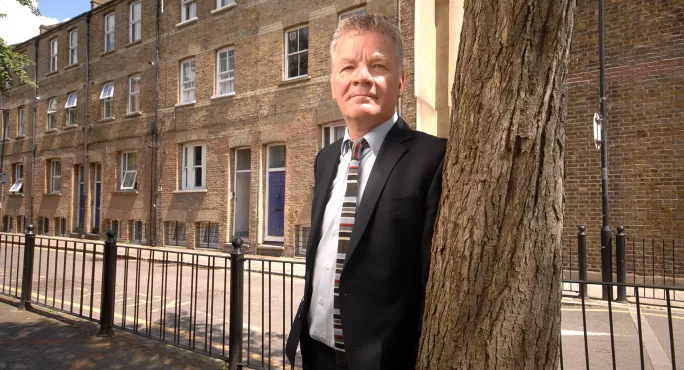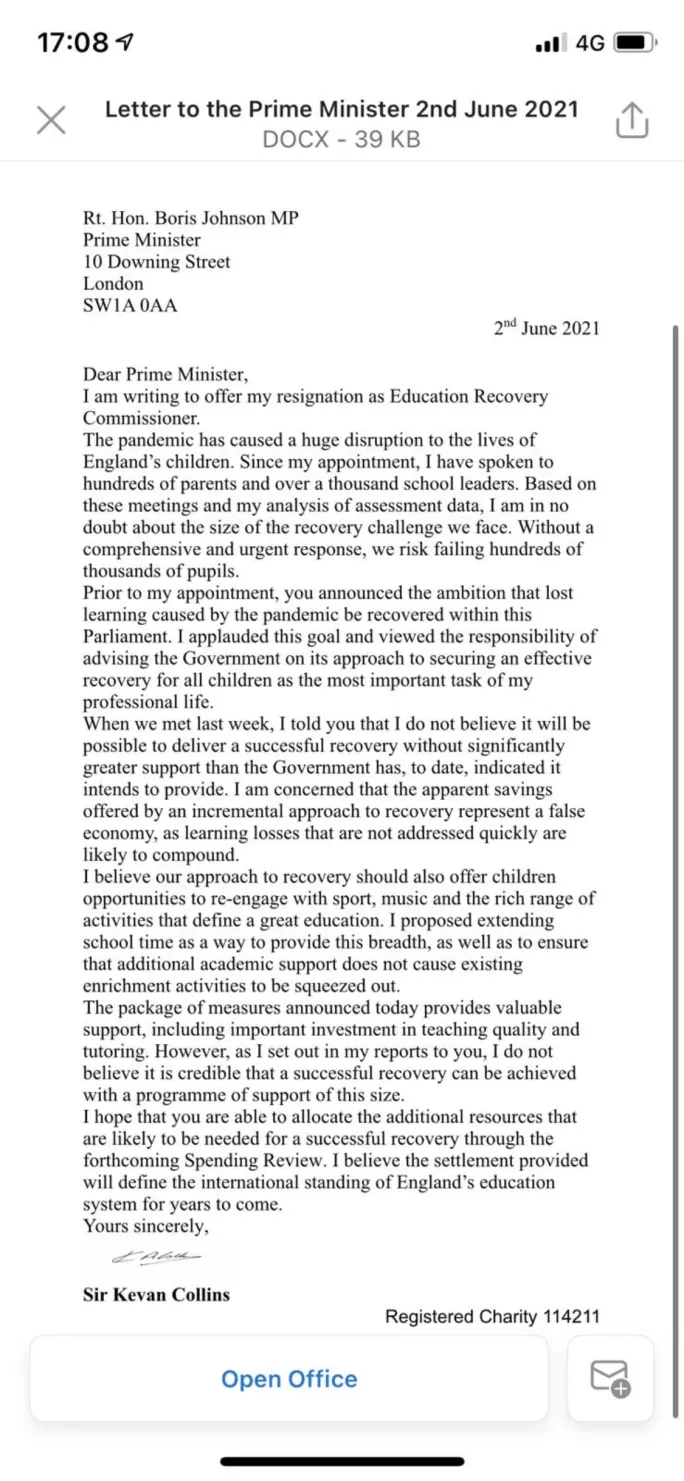
Exclusive: Sir Kevan Collins resigns over catch-up plan

Education recovery commissioner Sir Kevan Collins has written to the prime minister Boris Johnson to offer his resignation this afternoon.
Sir Kevan was unveiled by Boris Johnson as the government’s catch-up tsar just five months ago, tasked with overseeing the creation of a plan that would ensure pupils could recover after two periods of school closures during the coronavirus pandemic.
It was revealed this week that he had asked the government to fund a £15 billion catch-up package, but today the Department for Education came up with just £1.4 billion.
Related: Sir Kevan Collins’ decision to quit ‘is a real blow’
Background: No extended school day in new £1.4bn catch-up plan
Read: Catch-up plan a ‘paltry’, ‘disappointing’ ‘damp squib’
Sir Kevan reveals in his resignation letter, reproduced below in full, that when he met Mr Johnson last week, he told the prime minister it would not be possible “to deliver a successful recovery without significantly greater support”.
“I do not believe it is credible that a successful recovery can be achieved with a programme of support of this size,” he concludes.
Sir Kevan’s letter:

In a statement released this evening, Sir Kevan said: “After the hardest of years, a comprehensive recovery plan - adequately funded and sustained over multiple years - would rebuild a stronger and fairer system.
Sir Kevan Collins criticises ‘half-hearted approach’ to Covid catch-up
“A half-hearted approach risks failing hundreds of thousands of pupils. The support announced by government so far does not come close to meeting the scale of the challenge and is why I have no option but to resign from my post.”
He added that the package of support “falls far short of what is needed” as he warned that it is “too narrow, too small and will be delivered too slowly.”
“The average primary school will directly receive just £6,000 per year, equivalent to £22 per child. Not enough is being done to help vulnerable pupils, children in the early years or 16- to 19-year-olds,” Sir Kevan said.
On Wednesday, education secretary Gavin Williamson sidestepped questions about a row with the Treasury over the funding after Tes revealed that the new announcement represents only a fraction of the £15 billion that the Department for Education and Downing Street had been hoping to secure from the Treasury and does not include extending the school day, which was expected to be central to the plans. But Mr Williamson did admit that “there will be more that is required”.
Mr Johnson promised that there would be “more coming through” to support children in England who had missed lessons during the pandemic, following criticism from education leaders.
The defence came after Sir Kevan reportedly called for £15 billion of funding and 100 extra hours of teaching per pupil, rather than the £1.4 billion additional fund announced by the government.
Sir Kevan said in a statement on Wednesday evening: “One conservative estimate puts the long-term economic cost of lost learning in England due to the pandemic at £100 billion, with the average pupil having missed 115 days in school.
“In parts of the country where schools were closed for longer, such as the North, the impact of low skills on productivity is likely to be particularly severe.
“The pandemic has affected all pupils but hit disadvantaged children hardest. A decade’s progress to narrow the attainment gap between disadvantaged children and their peers is estimated to have been reversed.
“As part of the plan I proposed to government, I recommended a landmark investment in our teachers, whose dedication throughout the pandemic has been inspiring. It is also right to extend access to tutoring, in particular to support disadvantaged children.
“Tutoring can provide valuable support that complements classroom teaching. But it is not a panacea and must be high-quality to make a difference.
“This is one reason why I recommended schools and colleges be funded to extend school time for a fixed, three-year period and providing significant funding for a flexible extension to school time, equivalent to 30 minutes extra every day.
“From the perspective of teachers, extra time would have been optional and paid, with schools also able to use the time to offer enrichment activities that children have missed out on.”
The DfE’s programme includes £1 billion to support up to 6 million 15-hour tutoring courses for disadvantaged pupils, as well as an expansion of the 16-19 tuition fund, which will target subjects such as maths and English.
A further £400 million will go towards providing high-quality training for early years practitioners and school teachers to ensure that children progress.
But the announcement, made during half-term, does not include plans to lengthen the school day or shorten the summer break.
A Number 10 spokeswoman said: “The prime minister is hugely grateful to Sir Kevan for his work in helping pupils catch up and recover from the effects of the pandemic.
“The government will continue to focus on education recovery and making sure no child is left behind with their learning, with over £3 billion committed for catch-up so far.”
You need a Tes subscription to read this article
Subscribe now to read this article and get other subscriber-only content:
- Unlimited access to all Tes magazine content
- Exclusive subscriber-only stories
- Award-winning email newsletters
- Unlimited access to all Tes magazine content
- Exclusive subscriber-only stories
- Award-winning email newsletters
You need a subscription to read this article
Subscribe now to read this article and get other subscriber-only content, including:
- Unlimited access to all Tes magazine content
- Exclusive subscriber-only stories
- Award-winning email newsletters
- Unlimited access to all Tes magazine content
- Exclusive subscriber-only stories
- Award-winning email newsletters



